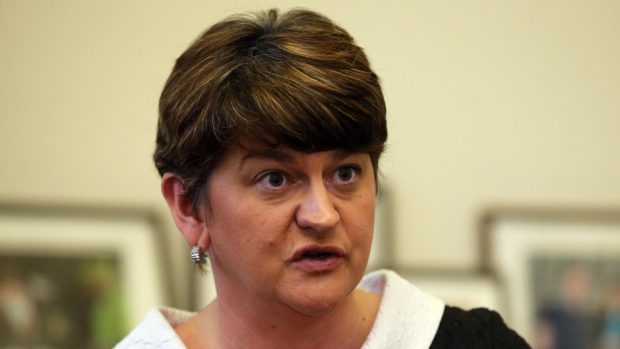Democratic Unionist leader Arlene Foster has indicated a deal to prop up the Conservatives’ minority government is close to being finalised.
She was welcomed into Number 10 Downing Street yesterday for talks with Theresa May after her party found itself an unlikely kingmaker.
As the meeting got under way, former Tory prime minister Sir John Major voiced concerns about the impact an agreement might have on the Northern Ireland peace process.
He warned a pact between the two parties could mean the UK Government would no longer be seen as impartial, adding that “hard men” were still “lurking in the corners of communities”.
Speaking after the talks, Mrs Foster said there had been “some very good discussions”, adding: “I hope that we can reach a conclusion sooner rather than later.
“There’s been a lot of commentary around the issues that we are talking about and it won’t surprise anyone that we are talking about matters that pertain, of course, to the nation generally.
“Bringing stability to the UK Government in and around issues around Brexit, obviously around counter-terrorism, and then doing what’s right for Northern Ireland in respect of economic matters.”
Earlier in the day, she declared “the future’s bright”, while DUP MP Ian Paisley reportedly added “the future’s orange” in an apparent reference to the Orange Order.
A Downing Street source said the talks had been “constructive” but refused to put a timescale on when they would conclude.
Mrs May, who left the negotiating table to be in the Commons for the speaker’s election and then travelled to France for a pre-arranged meeting with French President Emmanuel Macron, described them as “productive”.
Speaking at a press conference in Paris, she said: “What we are doing in relation to the productive talks we are having with the DUP is ensuring it’s possible with their support to give the stability to the UK Government I think is necessary at this time.”
Meanwhile, Labour leader Jeremy Corbyn has claimed a deal between the Tories and DUP would be a “coalition of chaos”.
And Sinn Fein warned such a move would undermine power-sharing talks at Stormont.
In a significant intervention, Sir John said: “The last thing anybody wishes to see is one or other of the communities so aggrieved that the hard men, who are still there lurking in the corners of the communities, decide that they wish to return to some form of violence.”
